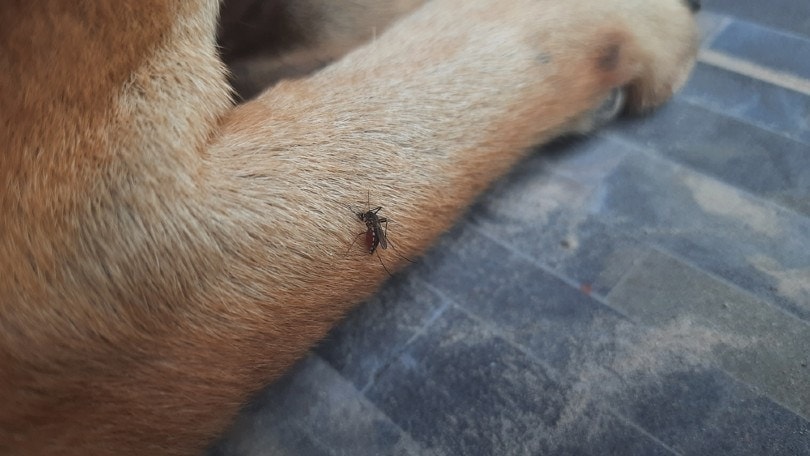Do Mosquitoes Bite Dogs? How to Protect Your Pup
By Luxifa Le
Updated on

Most people loathe mosquitoes. Our dogs probably hate mosquitoes as much as we do, seeing as they can be bitten by them too! Mosquitoes can be the bane of everyone’s existence, human or not. Since dogs can be bitten by mosquitoes, some pet owners may wonder if their dog can get any diseases from those annoying insects. Here’s some important information every dog owner should know about how mosquitoes interact with dogs.
Are Mosquitoes Dangerous to Dogs?
Mosquitoes can cause mild to severe problems when they sting humans. Most humans are mildly allergic to the mosquito’s saliva, resulting in a raised, itchy bump on the surface of their skin. Mosquitoes can carry dangerous diseases like malaria and West Nile Virus. But do mosquitoes pose a risk to dogs they bite or are they just a nuisance?
Mosquitoes can spread disease to dogs. Many mosquito-borne diseases have been found in dogs, including West Nile Virus. Mosquitoes are also
So, it’s safe to say mosquitoes and the illnesses they carry with them pose a threat to your dog. While the West Nile Virus incidence amongst dogs remains relatively rare, heartworms are one of the most dangerous parasites for dogs.

How Dangerous Are Heartworms?
Heartworms represent one of the most potent pathogen threats for dogs. Luckily, most dogs with heartworm infections undergo treatment with Immiticide successfully and without complication. However, heartworm infection can be fatal if left untreated in severe cases.
The heartworms will grow and reproduce in the vascular system, slowly infecting surrounding organs until the organs become impacted. It can take months for your dog to start showing symptoms of heartworm infestation. That’s why most veterinarians recommend that your dog be treated regularly with heartworm preventative medications to prevent infections rather than waiting for your dog to become infected.
Symptoms of heartworm infection in dogs include exercise intolerance, frequent coughing, not breathing, hyperventilation, heart failure, and canine caval syndrome.
How Do Dogs Get Heartworms from Mosquitoes?
Mosquitoes represent dog heartworms’ primary disease vector for introducing new infestations. Mosquitoes carry dormant heartworm larvae known as microfilariae. These larvae are injected into the bloodstream when the mosquito feeds off a vertebrate host.
Once in the bloodstream, the microfilariae may grow and mature into mature heartworms. Some dogs will pass the heartworms without becoming infested with them. However, the heartworms will take root in the dog’s arterial cavities and impact the heart and surrounding organs in the right conditions.
Heartworms are only transmissible from a mosquito host to a dog host. Therefore, they cannot be passed between dogs or dogs to humans.

How Can I Protect My Dog from Mosquitoes?
The way you protect your dog is by protecting yourself from mosquitoes. By ridding your yard of mosquitoes, you protect your dog and yourself from these annoying little twerps.
- Spray Your Backyard with a Natural Pesticide: One way to keep mosquitoes away is to spray your yard with a pet-safe pesticide regularly. Many all-natural and pet-safe pesticides on the market will keep the mosquitoes out of your yard all summer! Natural pesticides use compounds found in plants that ward off mosquitoes instead of synthetic chemicals used in traditional pesticides. It’s worth noting that the efficacy of natural pesticides is widely debated. Some people have great experiences with them. Others not so much.
- Light Dog-Friendly Pesticide Candles: Dog-friendly pesticide candles are a great way to keep mosquitoes out of your yard and increase the ambiance of your patio. Adding pesticide candles and torches to a repertoire of natural pesticide spray can help ensure that no tenacious mosquitoes make their way into your yard.
- Spray a Natural Bug Repellant on Your Dog’s Collar: Flea collars work by applying a repellant to the collar during the manufacturing process. You can make your own “mosquito collar” by spraying mosquito repellant on your dog’s collar. Ensure that the repellent you’re using is safe for your dog when doing this. Then, take your dog’s collar off and spray both sides of the collar thoroughly with bug repellent. Let the repellent dry completely before putting your dog’s collar back on. This method is excellent because it doesn’t just protect your dog against mosquitoes but all bugs that might try to turn your dog into a host! This is another perfect option to use in conjunction with other bug-repellent methods.
- Use an All-Natural, Dog-Safe Repellent on Your Dog: Some companies have stepped up to create dog-safe bug repellents that pet parents can rely on. These are rated to be sprayed all over your dog and mussed through the coat to provide comprehensive protection from creepy crawlies.
- Plant Some Bug Repelling Plants: Another option for keeping mosquitoes away from your dog is beautifying your yard with some mosquito-repelling plants. Catnip, mint, and lemongrass plants will all help keep mosquitoes at bay so you and your dog can enjoy your yard in peace. However, be cautious with lemongrass as it is on ASPCA’s list of toxic plants to dogs.
- Clear Away Standing Water: It’s no secret that mosquitoes breed in standing water, so clearing away any pools of standing water will prevent mosquitoes from turning your yard into their permanent residence.
- Get Your Dog a Bug Repellant Shirt: If topical bug repellents aren’t enough, consider getting your dog a shirt to wear to prevent mosquitoes from getting to their skin. Insect-repellent shirts for dogs are often treated with permethrin, a synthetic version of the natural insecticide found in chrysanthemums.
Risks of Using Permethrin in Multi-Pet Households
It’s worth noting that many insect repellents for dogs use permethrin to drive away pests. However, pet parents with multiple pets might want to take a step back before employing permethrin in their households; permethrin is highly toxic to cats, and ingestion of the substance can be fatal to them.
Pet parents with cats should never use permethrin sprays, shampoos, or shirts. Even if your cat doesn’t get the compound in its mouth, it could absorb it through a wound in the skin and die.

Final Thoughts
Mosquitoes aren’t just annoying; they’re also dangerous! Mosquitoes represent a potent threat to humans and dogs alike. So, keeping your dog safe from these pests will be essential! There are many methods out there for keeping mosquitoes away from your dog. Don’t be afraid to get creative with these pests!
Featured Image Credit: MR.CHATMONGKON, Shutterstock











